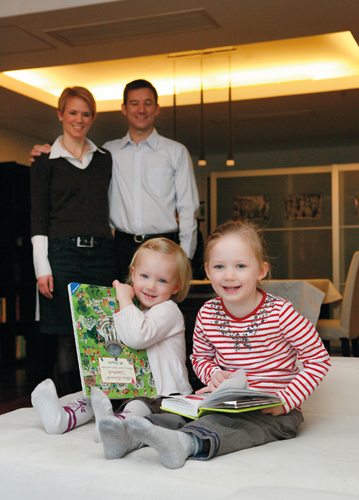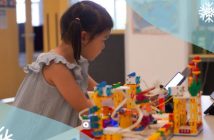 Do you know what a 3CK is, or a CCK? What about a Global Nomad, Military Brat or Missionary Kid? All of these names loosely describe someone who is a third-culture kid, or TCK. The term was made popular in the early 1960s thanks largely to Dr. Ruth Hill Useem, a pioneer in the field of TCK research. She defined TCKs as "a person who has spent a significant part of his or her developmental years outside the parents’ culture. The TCK builds relationships to all of the cultures, while not having full ownership in any." Sounds familiar, doesn’t it?
Do you know what a 3CK is, or a CCK? What about a Global Nomad, Military Brat or Missionary Kid? All of these names loosely describe someone who is a third-culture kid, or TCK. The term was made popular in the early 1960s thanks largely to Dr. Ruth Hill Useem, a pioneer in the field of TCK research. She defined TCKs as "a person who has spent a significant part of his or her developmental years outside the parents’ culture. The TCK builds relationships to all of the cultures, while not having full ownership in any." Sounds familiar, doesn’t it? Since the early 1990s, Beijing’s international community has flourished. Families from around the world came for a myriad of reasons and while most move on after a few years, many families are now choosing to stay. Mathieu and Miriam Robbe (French and German respectively) is one such couple. Their daughter Nathalie (4) was 3 months old when they moved to Beijing, while their daughter Sofia (2) was born here. Robbe says her children consider themselves French/German but they have French passports and both girls speak Chinese.
Despite their international backgrounds, Robbe believes her girls have a strong sense of identity. "Our children, especially the older one, understand that one day we will move back to Europe. Although [Nathalie] has Chinese friends, even at her young age she understands that there is a cultural difference."
Attachment issues and a sense of alienation are common problems among TCKs. When families leave their support networks behind to re-establish relationships in another country, it places a strain on both children and adults. A licensed psychologist and Director of Beijing United Family Hospital and Clinics’ (BJU) Psychological Health Center, Dr. Rob Blinn has been working with Beijing families since 2003. According to Blinn, "At the same time kids are trying to adjust, the parents are also dealing with adjustment issues. This means parents are devoting less time to the children who crucially need their support."
Blinn says that family is the filter through which children are introduced to culture. It is not necessarily being placed in a foreign country that causes problems for TCKs, rather their parents’ ability to empathize and communicate with them during this time that causes conflict. "A child’s inner resilience is directly related to the parent’s own coping abilities and flexibility. When parents are absent – whether because of travel or because the parent is on Facebook in the next room – children suffer."
Blinn goes on to say, "TCKs with strong, empathic, supportive families usually identify home as being where their nuclear family is. However, when a child has no secure base in his own family, home then becomes something external."
That’s not to say external factors do not play a role in a TCK’s sense of security. Robbe believes environment plays a large part in her children’s cultural understanding. "At home we speak both French and German – maintaining these native languages through books and music."
Though Robbe’s girls both attend a Chinese kindergarten, when the time comes, she would want them to attend a French or German elementary school. "I believe that their school environment, combined with their home environment, will largely shape their sense of cultural identity."
Integrating your home country’s customs and language with that of your adopted country helps avoid potential problems with living in a culture that is not your own. "People adapt best when they keep family and culture-of-origin customs while learning and adapting to the new culture. It is not about either/or; it’s about taking both new and old and combining it into a new entity," says Blinn.
Younger children, especially those who weren’t born in their home culture, may need more help understanding where they fit-in in relation to their extended family. "It is important that parents instill a sense of pride in one’s origins, whatever those origins are." Blinn suggests parents talk with their children about how they might answer questions of origin, as well as help their children identify which places feel like home.
TCKs may have more difficulties answering the simple question, "Where are you from?" but that isn’t necessarily a bad thing. "The answers are much more complicated than they used to be, but perhaps that’s what makes them much more interesting!" says Blinn. "I have lived in about 20 different locations. When someone asks me where I am from, I often say, ‘Be careful what you ask for,’ and then explain that it may take half an hour to answer their question."
Robbe agrees that feeling a connection to your home country and being able to express that connection is important, but adds, "It doesn’t so much matter whether we are German, French or Chinese – it is our values that shape our behavior and contact with others."
While raising TCKs requires parents to be aware of, and sensitive to, issues of identity and alienation, parents can take comfort in the fact that TCKs are also noted to be high achievers and bring a valuable skill set into their adult lives. Studies have shown that TCKs are four times as likely to earn a bachelor’s degree; divorce rates among TCKs are lower, and TCKs are more linguistically adept and able to understand foreign cultures – even those they have not lived in.
Ultimately, Robbe thinks her family’s time in China will benefit all of them. "I believe this experience will deeply influence my daughters (as well as my husband and I) and help them be open-minded towards different cultures in their future lives."
For parents of children who are struggling with issues of identity and culture, Blinn has a simple piece of advice: "Kids don’t need us in their faces 24/7, but they do need us around."
RESOURCES
www.tckid.com
A site for kids to connect with other TCKs and learn more about what it means to be a global citizen. Parent resources also available.
Third Culture Kids: The Experience of Growing Up Among Worlds
(Second Revised Edition)
by David C. Pollock and Ruth E. Van Reken
Read about the effects, both positive and negative, of raising kids in a global setting. Available from Amazon.com.
www.denizenmag.com
An online magazine filled with news, articles, diaries and experiences of a TCK generation. Designed with a teen audience in mind.



